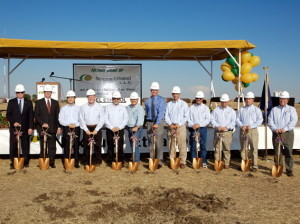In 2007, the 6,000 residents of Ulysses, Kan., were given big promises and high hopes with the proposal of a second major ethanol processing plant.
The facility, to be built by Nexsun Ethanol LLC, brought with it a commitment to the economic future of the community and the promise of 50 well-paying jobs.
Barely a year later, the project came to a grinding halt. Since then, Nexsun’s site on the edge of town has sat inactive, a monument to the federal government’s poor oversight of a little-known immigration visa program.
At the core of the Nexsun Ethanol deal is the federal EB-5 Immigration Visa program, a plan designed to stimulate foreign investment in U.S. companies. In exchange for investments of $500,000 or more and the creation of at least 10 new jobs, foreign nationals can gain U.S. residency for themselves and their families. But critics say the program is far from transparent.
Nexsun Ethanol could be Exhibit A.
Disciplinary Charges Filed
The State Bar of California filed disciplinary charges against Los Angeles lawyer Justin Lee in February for his role in the now-stalled ethanol plant, alleging he misappropriated more than $500,000 from a pair of Chinese nationals. According to the SBC, Lee traveled to Asia in 2009 and 2010—two years after breaking ground on the Ulysses plant—to seek out foreign nationals interested in permanent residency in the United States.
A Chinese couple paid Lee to help them through the EB-5 program to secure U.S. residency for themselves and their child. But before their petition was approved, the SBC says, Lee allegedly transferred the couple’s money to Nexsun and spent it between Aug. 18 and Dec. 31, 2010.
The Chinese nationals brought a lawsuit against Lee in 2012, and although they settled for $550,000, Lee ended up paying only $300,000, according to the SBC.
Seven Misconduct Counts Leveled
Lee, 56, faces seven counts of misconduct, including failure to maintain client funds in a trust account; moral turpitude by misappropriation of funds; failure to inform a client of a significant development; moral turpitude by misrepresentation; breach of common law fiduciary duty; failure to pay clients funds promptly; and maintaining a conflicting relationship with a party or witness.
Lee not only owned the investment fund to which the Chinese nationals had given their money, he also owns Nexsun Ethanol LLC and the Kansas Biofuel Regional Center, which managed the EB-5 program connection.
The California Secretary of State lists Lee as the primary contact for the American Immigrant Investment Fund, where the Chinese nationals’ money was initially transferred. A 2007 letter from U.S. Citizenship and Immigration Services names Lee as president of the Kansas Biofuel Regional Center, through which he promoted his EB-5 ventures. Finally, Nexsun’s own Web site lists Lee as the chairman and founder of the biofuel company.
If convicted, he faces suspension or revocation of his license to practice law. A trial date has been postponed until Aug. 6. In response to the charges, Lee heaped blame for the matter on his former business partner, Thomas Kent.
But the Chinese investors aren’t the only ones who got stung by Lee’s alleged dealings.
‘We’ve Been Duped’
“I think most people in Grant County feel that we’ve been duped,” said County Commissioner Marty Long.
Long said he thought Nexsun initially poured about $1 million into the location on the western edge of Ulysses.
“It was mainly on railroad improvements on the site, because most of the ethanol that had to be made had to be shipped out on rail,” Long said. “Who would spend a million on a project and quit?”
Before his current position as city manager of Pittsburg, Kan., Daron Hall worked in a similar capacity for Ulysses. By the time Hall arrived in 2008, he said, construction of the ethanol plant already was at a standstill. But while the site itself was a ghost town, Nexsun was anything but inactive. The company opened an herbal pill manufacturing and distribution business in town and also secured a contract to repair the roof of a local building.
“There were always odd things going on,” Hall said. “Nexsun was doing a lot of stuff in town, and none of it was on a very big scale, and none of it was at the ethanol plant.”
Neither Lee nor Kent responded to calls for comment.
Travis Perry ([email protected]) reports for Kansas Watchdog. Reprinted with permission of Kansaswatchdog.org.




